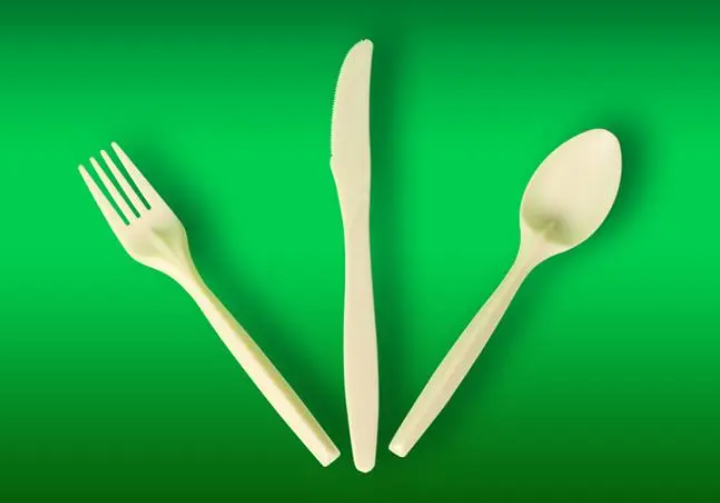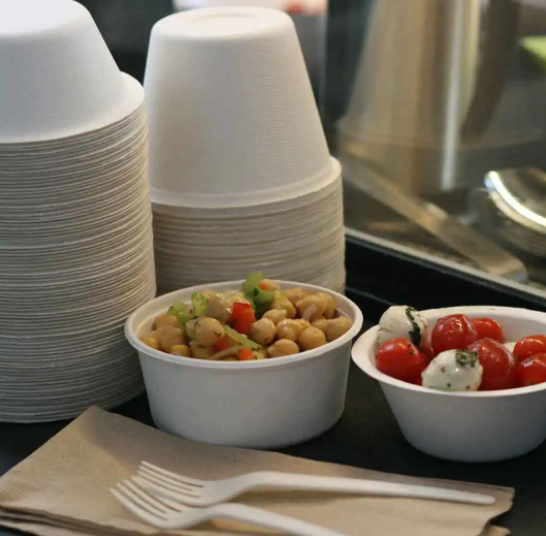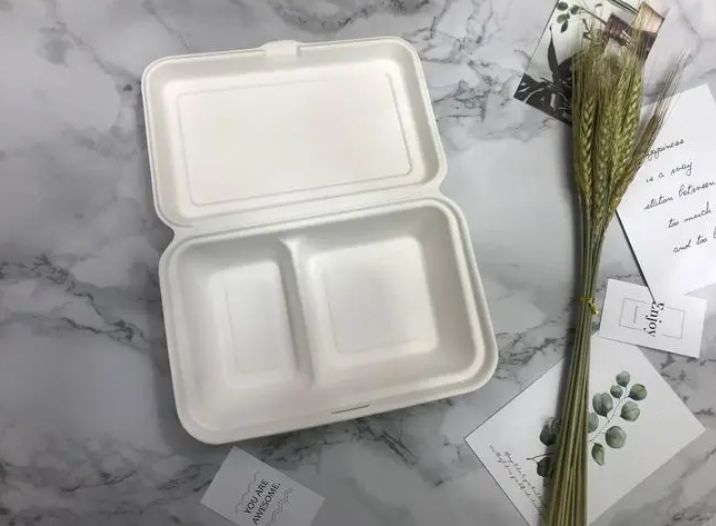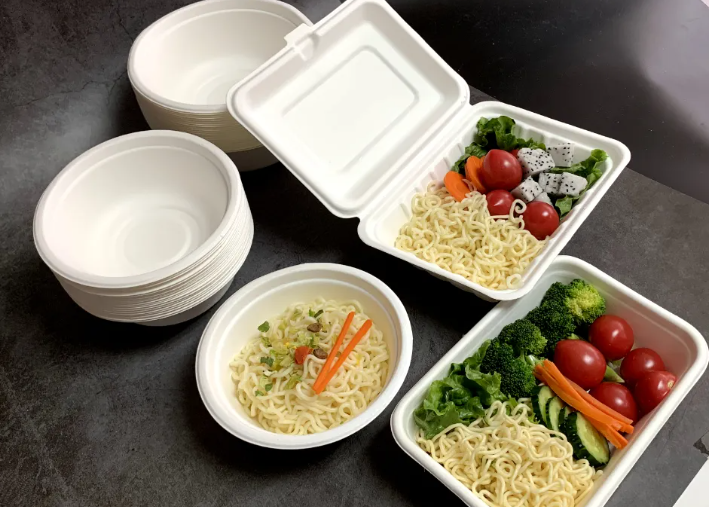Global Leading Automatic
Production Base of Eco Cup Lids
Production Base of Eco Cup Lids
The recycling of plastic tableware is difficult, the raw material supply of degradable disposable tableware is tight, and the catering industry has a long way to go to reduce plastics in an all-round way.
The recycling of plastic tableware is difficult, the raw material supply of degradable disposable tableware is tight, and the catering industry has a long way to go to reduce plastics in an all-round way.
McDonald's China announced on June 30 that it will gradually stop using straws, which once again raised concerns about the problem of plastic reduction in the catering industry.

In fact, the plastic reduction action has already been quietly launched among the catering giants. Chain companies such as McDonald's and Starbucks have previously promoted environmental protection by replacing paper bags and reducing the use of plastic straws. At the same time, with the rapid development of the catering takeaway business, the takeaway platform has also launched plastic reduction actions, including the implementation of the "no tableware" option for takeaway.
The comprehensive reduction of plastics in the catering industry has entered the countdown. The "Opinions on Further Strengthening the Control of Plastic Pollution" issued by the National Development and Reform Commission requires that by the end of 2020, the use of non-degradable disposable plastic straws will be banned in the catering industry nationwide; Degradation of single-use plastic tableware.

However, a reporter from the Beijing News learned from an interview that at present, plastic straws in the catering industry are concentrated in plastic straws. It is easier to achieve by changing the design of the cup lid and replacing them with paper straws, while the plastic reduction of lunch boxes and packaging faces certain challenges. difficulty. An industry insider engaged in packaging materials revealed to the Beijing News reporter that the high cost of degradable lunch boxes and the shortage of raw materials are one of the factors that hinder comprehensive plastic reduction.
Stop plastic straws, improve lids and paper straws to become new favorites
On June 30, McDonald's China announced that nearly 1,000 restaurants in the four cities of Beijing, Shanghai, Guangzhou and Shenzhen will be the first to implement the use of plastic straws. Consumers can directly drink cold drinks (such as cola) without solids through the new cup lid. Relevant plastic reduction measures It will cover all restaurants in mainland China by 2020, and it is expected to reduce the amount of plastic used by about 400 tons per year. A reporter from the Beijing News noticed that McDonald's has improved the lid of the beverage cup, so that beverages such as cola and juice can be dispensed with straws.

McDonald's plastic reduction efforts began a dozen years ago. In 2007, McDonald's replaced take-out plastic bags with paper bags, which reduced more than 2.5 billion plastic bags. 10% plastic usage. According to McDonald's, in 2020, 100% of all the paper packaging at McDonald's will come from the original paper certified by the Forest Stewardship Council (FSC).
Starbucks, Heytea, etc. are also gradually reducing the use of disposable plastic straws. In April 2019, Starbucks started pilot projects in Shanghai and Shenzhen, and stopped providing plastic straws. For ordinary beverages, the newly developed direct drinking cup lids are used, and beverages that require straws use paper straws. According to media reports, as of December 31, 2019, Starbucks has completed the conversion of disposable straws in all stores in mainland China, and can achieve its commitment to "stop the use of plastic straws globally by 2020" ahead of schedule. It is worth noting that in order to promote the concept of environmental protection and reduce the use of disposable cups, Starbucks also advocates that consumers bring their own cups of coffee, and they can get a discount of 2 yuan for bringing their own cups.

HEYTEA has also launched paper straws since 2019. It was previously reported that as of the end of 2019, 14.4% of HEYTEA users chose paper straws as the most frequently chosen type of straws, while in Shanghai, the proportion exceeded a quarter.
It is difficult to implement plastic reduction in food delivery
According to the survey data from iiMedia Research, the scale of the domestic food delivery industry has gradually increased in recent years. Among them, the scale of China's food delivery industry in 2019 was 653.6 billion yuan. It is expected that in 2020, online catering will account for more than 20% of the entire catering industry. .
"We used to make packaging materials for electronic products. In 2014, we saw the development potential of the takeaway market and began to transform into food lunch boxes. The business is getting better year by year, and now the sales of lunch boxes have exceeded that of electronic products", Jiangsu A staff member of a packaging materials company told the Beijing News reporter to Bo Xi.
The rise and development of takeout has provided more convenience for daily life, but the use of tableware, meal bags, and packaging has also accelerated environmental pollution. As early as January 2019, Zhang Lei, member of the Shanghai Municipal Committee of the Chinese People's Political Consultative Conference and deputy director of the Shanghai Municipal Bureau of Market Supervision, publicly stated that the development of the food delivery industry is growing very fast. Meal bags, resulting in new white pollution, need to establish a diversified and effective governance system.
The Beijing News reporter noticed that the two food delivery platforms Meituan and Ele.me have realized the environmental pollution problem of the food delivery industry. Taking Meituan Takeaway as an example, in August 2017, the “Qingshan Plan” was launched to promote the environmental protection process of the takeaway industry, including the launch of “no cutlery option” on the takeaway platform, and the pilot of packaging upgrade “replace plastic with paper” to deliver environmentally friendly meals. Boxes, the establishment of environmental protection public welfare special funds and other measures. Ele.me cooperated with industry associations, packaging manufacturers and catering merchants to promote environmentally friendly packaging and edible chopsticks, and also launched the "no tableware" option on the platform.
However, the implementation of "no cutlery" for takeaways by catering businesses is not in place. A reporter from the Beijing News interviewed three post-90s consumers. They all said that even if they chose "no tableware" when ordering takeout, the merchant would still give tableware.
In this regard, an unnamed catering practitioner told the Beijing News reporter: "Sometimes I am too busy to read the specific information of the order, and sometimes I will send tableware when I see it, because some need tableware but forget to change the options, we I have to make another trip to deliver the tableware, which is too troublesome, and I’m afraid of bad reviews.”
The supply of biodegradable raw materials is tight
According to industry insiders, the plastic reduction of straws is currently the easiest to achieve, and the design of the cup lid can be changed and replaced with paper straws. However, to reduce the use of plastic lunch boxes, there are problems such as high cost of degradable lunch boxes, shortage of raw materials, and difficulty in recycling.
The Beijing News reporter learned that plastic lunch boxes are commonly used in China, mostly made of PP, PS, PET and other materials. According to Xiang Boxi, the lunch boxes made of the above materials can be recycled, that is, the lunch boxes can be sorted, recycled and crushed before returning to the furnace for use. However, residents' awareness of garbage classification is still in its infancy, and recycling is still not easy. The cost of degradable tableware is 1-2 times that of ordinary plastic lunch boxes. Catering companies, especially fast food companies, have limited profits, and the price of packaging materials will increase by 1-2 yuan, which will be directly reflected on consumers.
"Only replacing plastic straws, large catering companies need to increase the cost of tens of millions of yuan; if the existing non-degradable disposable plastic tableware is fully replaced as required, large catering companies will increase the cost of tableware by 100 million yuan. "At this year's National People's Congress, Hong Mingji, member of the National Committee of the Chinese People's Political Consultative Conference and president of Yoshinoya, proposed that the catering industry be allowed to postpone the implementation of the "Opinions on Further Strengthening the Control of Plastic Pollution". He believes that catering companies will increase the unaffordable huge packaging cost, which is a serious economic pressure for the catering industry hit by the epidemic.
Hong Mingji wrote in the proposal that according to the information provided by plastic tableware suppliers, the raw materials that can produce degradable disposable plastic tableware in China - the supply of food contact grade PLA raw materials is very tight, and it will be difficult for catering enterprises to find so many food safety requirements. of degradable disposable plastic tableware products.
Xiang Boxi told the Beijing News reporter that the supply of PLA raw materials is indeed very tight, and there are often panic buying abroad, and the price is relatively high. The price per ton of pp material is 9,000 yuan, while the food contact grade PLA needs 20,000-30,000 yuan per ton. To make a lunch box made of PLA material, a special machine is required, and the price of the machine is also very expensive, so the price of the finished product is also It is relatively high, and it is difficult to promote vigorously.
However, environmental protection cannot be delayed. According to the "Opinions on Further Strengthening the Control of Plastic Pollution" issued by the National Development and Reform Commission in January this year, by the end of 2020, the use of non-degradable disposable plastic straws will be banned in the catering industry nationwide; The use of non-degradable disposable plastic tableware is prohibited. By the end of 2022, the use of non-degradable disposable plastic tableware will be prohibited for dine-in services in built-up areas and scenic spots in the county. Therefore, the comprehensive reduction of plastics in catering enterprises is imperative and has a long way to go.
